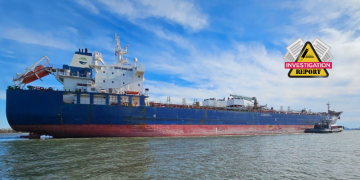Maritime corruption in Nigeria’s port sector has significant economic repercussions, as highlighted by a recent study from the Maritime AntiCorruption Network (MACN) and QBIS.
The report outlines findings from a study conducted by QBIS, a socio-economic impact assessment firm, which quantifies the financial impact of maritime corruption on the private sector, government, and society in Nigeria.
As informed, more than 80% of world trade is transported by sea, and societies and businesses depend on the efficient clearance of vessels and goods in ports worldwide to function, develop, and prosper. In a seaport, multiple agencies hold administrative monopolies over essential services intended to facilitate trade.
This creates opportunities for ‘coercive’ corruption where government officials extract bribes from companies for performing routine tasks during vessel and cargo clearance. Maritime corruption of this kind causes commercially damaging delays to ships, generates higher trade costs, endangers the wellbeing of seafarers, exposes companies and seafarers to the risk of criminal prosecution.
Corruption in the maritime value chain drives up the cost of doing business, and a portion of these additional costs is ultimately passed on to the end consumer. This impact is particularly severe in low- and middle-income countries, which rely heavily on essential imported goods such as cooking oil, fuel, and pharmaceutical products.
This study examines costs across the entire supply chain for importing petrol and food products transported by dry and wet bulk vessel to Nigerian ports and terminals. The assessment captures the import costs from sea transport to the price to the end consumer in the supermarket excluding profit, considering some of the hidden indirect costs from long lead times and delays as well as corrupt payments. The study has broken down the import supply chain in the following 15 steps, and studies costs associated with each step.
With 63% of Nigerians or 133 million people classified as multidimensionally poor, most Nigerian families do not have a budget surplus. Increased import costs due to corruption are therefore likely to reduce their household demand and make essential goods less affordable to the average Nigerian family.
..the study highlights.
The total economic damage of maritime corruption is likely to be much higher, the study warns. If similar costs of corruption apply to container imports, the economic damage of maritime corruption will more than double according to the study.





























































